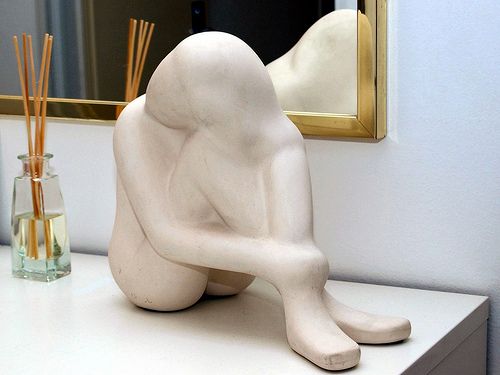You have no items in your cart. Want to get some nice things?
Go shopping
You only hesitated for a few seconds when he said he could pull your tooth today. You glanced at the clock on the wall of the cubicle, and asked him how long it would take.
“Five minutes,” he said.
The dental nurse at your side nodded. “He’s really quick,” she said, when he’d left your cubicle to anesthetize a patient in the cubicle next door.
The numbing gel tasted like strawberries, but it worked and you barely felt the dozen or so injections of local anesthetic placed into your upper jaw and the roof of your mouth. You told him it was numb, but he wanted to wait a few more minutes, just to make sure.
“Do you mind if I have some dental students watch?” he said, and shook you head, mumbled through thick lips that you didn’t mind. “You’re the first extraction of the day,” he said. You looked at the clock again, the minute hand just turning the hour.
“It’s 3pm,” you said, “I bet I’ll be your last too.”
You couldn’t easily tell whether the dental students were male or female; they were gowned and masked, with nets over their hair, but you noticed that they both had brown eyes. One of them commented that they couldn’t really see, and only then did you figure out that they were both girls. The dental nurse—you think her name was Gina, but she hadn’t introduced herself—told them to stand in front of your chair so that they’d have a clear view into your mouth. She adjusted the pink sheet covering your chest and fiddled with tools that you couldn’t see.
“Let’s get started,” he said, “and you’ll be out of here in less than ten minutes. You’re going to feel a little pressure. No pain, just some pressure while I’m loosening your tooth.” Then, his gloved hands were in your mouth, something clamped over the tooth that you first broke five years ago (had it really been that long?) and that broke again, down to the gum, when you were intubated for surgery last year. You’d waited because it didn’t hurt and because you didn’t have the money for an extraction and because, if you’re honest, you’re just a little bit vain and don’t want a missing tooth. But lately, it hurt when you took a hot drink, or if the water was a bit too cold when you brushed your teeth, and sometimes, tiny bits of food lodged in a cavity and you’d have to floss them out. Then, you had an unexpected windfall, $500, and you promised yourself that you’d get it taken care of before it caused a real problem.
“I could save it,” he’d told you, about fifteen minutes earlier, pointing to the broken tooth on the x-ray image in front of him, “but I’ll be honest; it would cost as much to save it as it would to have an implant and I don’t know how long it would last.”
“Let’s just take it out then,” you’d said, because that’s what you had expected anyway.
“I can do it today,” he’d said, and in that brief instant of decision-making you thought about the fact that you’d be teaching again next week, and it would be awkward to schedule it around your teaching schedule. Then there’s that big interview you have in Florida in February, the campus visit for the job you’ve always dreamed of, and you’d really rather not be distracted by a broken tooth when you’re trying to impress college faculty. And then there’s just the hassle of getting down here, battling to find parking, paying for the parking—it’s only a couple of dollars, but still, if you don’t have to pay it… So you’d said sure, take it out today. Let’s get it over with.
You felt the pressure first in your cheekbone, and you thought your other teeth—the perfectly healthy neighbors of your broken tooth—were going to pop out too. He had one hand on your head, holding it still, and the other clamped to something that was clamped to your tooth, something that he was pushing on, then pulling on, then pushing again. You could hear something cracking, like a sheet of ice breaking, so you squeezed your eyes shut a little tighter, like shutting off your vision would shut off your hearing too, and tried to force yourself to relax, to be calm, to breathe, because this was all going to be over in five minutes.
Gina was telling you to breathe, too, with one hand on your shoulder, and he was still pushing and pulling and then you can feel the pressure in your sinuses, like they’re going to explode, and in your eye sockets, and you wonder if he could push your eye out, he’s pushing so hard. There’s no let up in his pushing until whatever is clamped to your tooth slips off with a jerk, and you make a half cry of shock, and he tells you it’s okay, don’t be scared. “This is exactly what’s supposed to happen,” he says, and you know in that broken second that this isn’t exactly what’s supposed to happen because no one says that when things are going to plan.
“You have long roots,” he says, and you don’t know if you should apologize or not, but you decide against it because the thing that had been clamped to your tooth was clamped again, and there he was, again, pushing and pulling and pushing, and you could still hear the cracking, but you knew, oh yes you knew, that the tooth wasn’t moving.
You swallowed, and felt the salty taste of blood in the back of your throat. Probably only a drop, you told yourself, and it must mean it’s nearly over. You wondered how long it had been, maybe it just seemed like time had coagulated around you, but if you opened your eyes to look at the clock then you’d see what he was holding and it was probably best not to see.
“Don’t be scared,” he said, again, “this is exactly what’s supposed to happen. And you know you can raise your left hand any time you need a break.”
You clenched your left hand tighter over your right, pinched your short nails into the skin, and tensed your shoulders while he pushed and pulled some more and Gina started to stroke your shoulder and whispered that it was going to be okay, and then you heard a clatter and one of the students say that she felt faint, and the pushing and the pulling stopped while the other dental student found a chair for the girl who felt faint and sat her down with a glass of water.
It was then that you realized you were shaking, your hand trembling wildly, your shoulders jumping with adrenaline.
“Can you carry on?” he said, and you nodded, but you opened your eyes first and you looked at the clock and you saw that it had been twenty minutes, not five, and that the dental nurse on the chair had a look of panic in her brown eyes so you closed your eyes again, as tightly as you had ever closed them in your life, tighter than that time when you were a kid and your dad was watching “True Grit” with John Wayne and the girl was in the snake pit and you were terrified, tighter than that; tighter than they were when you gave birth to your youngest daughter in 15 minutes without pain relief, tighter still when you felt that thing that you couldn’t see clamp around your tooth and the pushing and the pulling started again and your throat let out a guttural noise that you couldn’t stop and didn’t know was you until he stopped pushing and pulling and whispered something to Gina.
“It’s all okay,” he said, “this is not a problem at all, it sometimes happens that we have to cut your tooth to get it out, so we’re just going to cut your tooth and you won’t feel a thing because it’s your tooth, but you will hear the saw and you might smell the tooth when it’s cut, but there’s no need to be afraid.” And that’s the moment when you were afraid, the moment when you knew that the rush of adrenaline was fear, and that you were really trying to stop yourself screaming at him to stop, to leave you alone, but you felt the blood trickle down your throat again and knew, with a sickening lurch in your stomach, that the only way was through.
You heard the whine of the saw, felt the vibrations as it squealed through your tooth, the tiny splashes of water from the spray jet Gina held in one hand, and you smelled hot bone deep in your nose and you tightened your eyes even more and started to recite “The Walrus and the Carpenter” in your head, until things went a little dark and the sound of the saw was replaced by the sound of a thousand trucks pouring gravel into your head and the world went black.
You didn’t hear the pop when the pieces of tooth came out, when the root—curved like a hook—finally released from the bone. You didn’t feel the pressure suddenly stop, or his hand withdraw from your mouth, and you didn’t hear the chink of tooth against a stainless steel dish, but you heard him say that he was just holding your jawbone together so it would knit a little easier, and you felt Gina place a thick gauze in your mouth to stem the bleeding, and you opened your eyes and saw the bloody tissues when she wiped your face. When you tried to sit up, Gina pushed you gently back down and told you to wait. He said, “that took a bit longer than I thought, but it’s all okay now.” And then he gathered the dental students and took them to another room to talk about you while you shook in the chair and Gina wiped the blood from your face and the tears that you didn’t know you had cried from the corners of your eyes.

About Catherine Brereton
Catherine A. Brereton is from England, but moved to America in 2008. Her most recent work can be found in The Establishment, The Toast, Crack the Spine, Ekphrastic, The Indianola Review, and Literary Orphans, and is forthcoming in Prairie Schooner, Cheat River Review, and Star 82 Review. One of her essays was recognized as a Notable Essay in Best American Essays, 2015, and she is 2015 winner of The Flounce's Nonfiction Writer of the Year Award. Catherine has an MFA from the University of Kentucky, and she lives in Lexington, Kentucky, with her wife and their teenage daughters.



